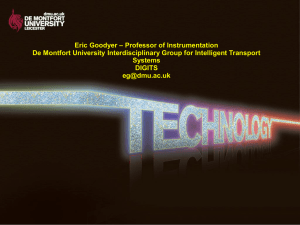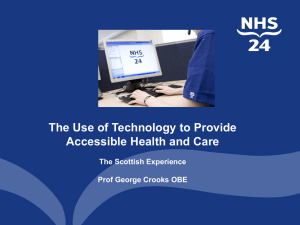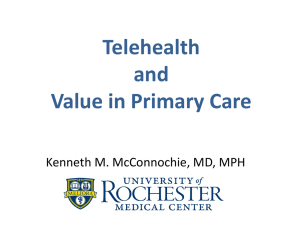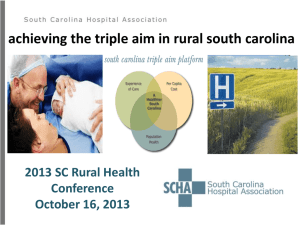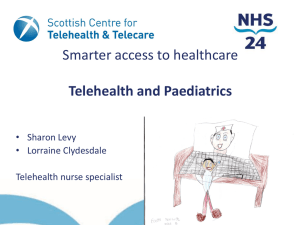Telemedicine, Telehealth, Telecare
advertisement
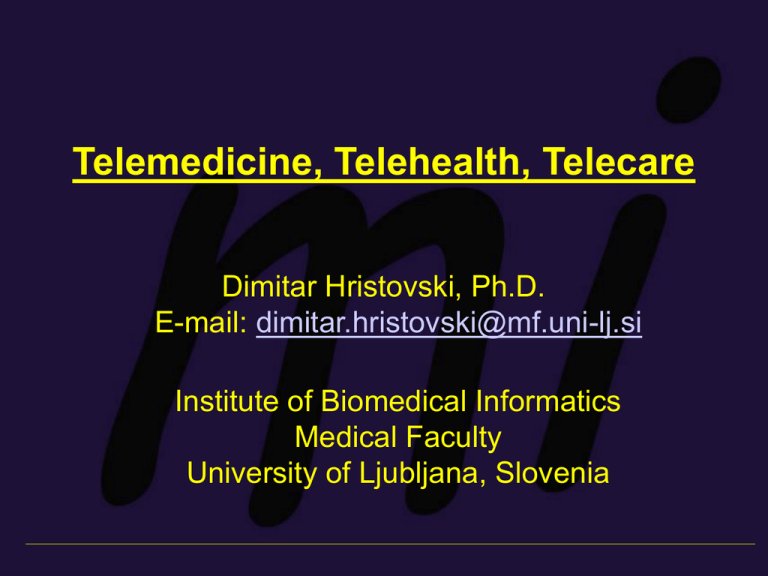
Telemedicine, Telehealth, Telecare Dimitar Hristovski, Ph.D. E-mail: dimitar.hristovski@mf.uni-lj.si Institute of Biomedical Informatics Medical Faculty University of Ljubljana, Slovenia Definitions Tele- (from Greek: far, at a distance, remote) Telemedicine utilizes information and telecommunications technology to transfer medical information for diagnosis, therapy and education. Telehealth is the use of information and communication technologies to transfer healthcare information for the delivery of clinical, administrative and educational services. Telecare utilizes information and communication technologies to transfer medical information for the diagnosis and therapy of patients in their place of domicile. Alpe Adria Master Course :: Medical Informatics :: Dr. D. Hristovski: Telemedicine, Telehealth, Telecare Historical Overview of Telemedicine Development in Regard to Used Technology Telegraphy and telephony Radio Communications Television and video Information technology (digital data transmission) Alpe Adria Master Course :: Medical Informatics :: Dr. D. Hristovski: Telemedicine, Telehealth, Telecare Non-Technological Drivers of Telemedicine and Telecare Extension of Access to Healthcare Services: Healthcare Provision for Travelers: Remote rural areas (e.g. USA, Australia) Areas cut off from normal transport at certain times of the year by bad weather (e.g. Canada, Norway) Prisoners Psychiatric patients At the sea In the air Military Applications Alpe Adria Master Course :: Medical Informatics :: Dr. D. Hristovski: Telemedicine, Telehealth, Telecare Non-Technological Drivers of Telemedicine and Telecare (cont.) Home Telecare Increase in the proportion of older people in the population Increased incidence of chronic, long-term conditions Majority of elderly people prefer to live in their own homes Tele-visits by a video link and transmission of up to date information and vital signs Cost Reduction Smaller transport expenses Allow specialist services at remote locations where employment of healthcare workers not economically justified Market Development Health Policy and Strategy Alpe Adria Master Course :: Medical Informatics :: Dr. D. Hristovski: Telemedicine, Telehealth, Telecare Technological Drivers of Telemedicine and Telecare Computing and Information Technology Falling equipment costs Increased power on the desktop, Ease-of-use Modern developments in videoconferencing Increase in the reliability of equipment Network and Telecommunications Infrastructure Faster and more reliable network connections Low-performance modems based on copper wire transmission supplemented by faster media and technologies using fiber-optic cables Introduction of new communication protocols (e.g. ADSL and ATM) Major developments in wireless and satellite technologies Alpe Adria Master Course :: Medical Informatics :: Dr. D. Hristovski: Telemedicine, Telehealth, Telecare Technological Drivers ... (cont.) Technology-Led Society. Ever increasing appetite of society for: Speed Convenience Quality Alpe Adria Master Course :: Medical Informatics :: Dr. D. Hristovski: Telemedicine, Telehealth, Telecare The Future for Telemedicine Moving telemedicine out of the pilot study phase and into the mainstream Health policy and strategy Telecare to play a significant role given the ageing populations throughout the world The role of the Internet Education of both care providers and patients Transmission of health information and images Enhancing healthcare in underdeveloped countries By developed countries, commercial companies and non-profit organizations Alpe Adria Master Course :: Medical Informatics :: Dr. D. Hristovski: Telemedicine, Telehealth, Telecare Types of Telemedicine Teleconsultation Tele-education Telemonitoring Telesurgery Alpe Adria Master Course :: Medical Informatics :: Dr. D. Hristovski: Telemedicine, Telehealth, Telecare Teleconsultation Medical consultation is at the heart of clinical practice Teleconsultation to support clinical decision making is the most frequent example of telemedical procedures (35%) Actors Health providers without a patient Health provides and a patient (changed relationship provider:patient) Mode of communication Telephone Video conferencing link in real time Store-and-forward mode (most frequently in teleradiology for large X-ray files transmission) Alpe Adria Master Course :: Medical Informatics :: Dr. D. Hristovski: Telemedicine, Telehealth, Telecare Tele-education Types of tele-education depending on who is the recipient and what is the purpose of the transmission: Clinical education from teleconsultation Clinical education via the Internet Academic study via the Internet Public education via the Internet Alpe Adria Master Course :: Medical Informatics :: Dr. D. Hristovski: Telemedicine, Telehealth, Telecare Telemonitoring Telemonitoring is the use of a telecommunications link to gather routine or repeated data on a patient’s condition (e.g. blood pressure, ECG, ultrasound …) Data acquisition process: Manual, then electronic transmission Automatic, then electronic transmission The purpose of monitoring is to decide if and when an adjustment is needed to the patient’s treatment The adjustment can be communicated verbally by telephone or automatically using a touch-tone telephone and a computer telephone integrated (CTI) system Alpe Adria Master Course :: Medical Informatics :: Dr. D. Hristovski: Telemedicine, Telehealth, Telecare Telesurgery Compared to other ‘tele’ applications, telesurgery in its infancy Types: Telementoring: assistance given by specialists to surgeons carrying out a surgical procedure at a remote location Telepresence surgery: guides robotic arms to carry out remote surgical procedures Distance can be small (same room) using movement scaling technique (large movement of surgeon’s hands scaled down to very precise, tremor-free movements Data Glove for hand’s movement transmission Virtual reality operation simulation before the real surgery Alpe Adria Master Course :: Medical Informatics :: Dr. D. Hristovski: Telemedicine, Telehealth, Telecare Benefits of Telemedicine Better access to healthcare Access to better healthcare Improved communication between carers Easier and better continuing education Better access to information Better resource utilization Reduced costs Alpe Adria Master Course :: Medical Informatics :: Dr. D. Hristovski: Telemedicine, Telehealth, Telecare Limitations of Telemedicine Poor patient-healthcare provider relationships Poor relationships between healthcare professionals Impersonal technology Organizational disruption Additional training needs Difficult protocol development Uncertain quality of health information Low rates of utilization Alpe Adria Master Course :: Medical Informatics :: Dr. D. Hristovski: Telemedicine, Telehealth, Telecare Barriers to Progress of Telemedicine Telecommunications infrastructure and standards Cost effectiveness National policy and strategy Ethical and legal aspects Alpe Adria Master Course :: Medical Informatics :: Dr. D. Hristovski: Telemedicine, Telehealth, Telecare Technology of Telemedicine Systems Types of telemedicine information Important transmission parameters Text and data Audio Still (singe) images Video (sequential images) Still image and video compression Frame rate and bandwidth Telecommunication standards Teleconsultation system components Videoconferencing system Multipoint videoconferencing system Image display system Telemonitoring devices Alpe Adria Master Course :: Medical Informatics :: Dr. D. Hristovski: Telemedicine, Telehealth, Telecare Technology...(cont.) Telecommunication media suitable for telemedicine system implementation Public Switched Telephone Network Leased lines ISDN Satellite Wireless Technologies ATM ADSL Alpe Adria Master Course :: Medical Informatics :: Dr. D. Hristovski: Telemedicine, Telehealth, Telecare Technology ... (cont.) Integration and operational issues Integration with other healthcare information systems (e.g. Electronic medical record) Store-and-forward operation Real-time telemedicine Alpe Adria Master Course :: Medical Informatics :: Dr. D. Hristovski: Telemedicine, Telehealth, Telecare Telemedicine Service Providers and Applications Mainstream health sector services General practitioners and Primary Care Services Monitoring of conditions Minor injuries and emergencies Better coordination with secondary care Acute hospital and Secondary care services Tele-radiology Tele-dermatology Tele-neurophysiology Tele-cardiology Tele-psychiatry Tele-ophthalmology Tele-pathology Tele-obstetrics Tele-oncology Alpe Adria Master Course :: Medical Informatics :: Dr. D. Hristovski: Telemedicine, Telehealth, Telecare Providers and Applications... (cont.) Pharmacy services Electronic prescriptions Buying drugs over the Internet Commercial services and other agencies Managed care organizations Transport services Military agencies Space exploration agencies Alpe Adria Master Course :: Medical Informatics :: Dr. D. Hristovski: Telemedicine, Telehealth, Telecare Recommended Literature Essentials of Telemedicine and Telecare. A.C. Norris. John Wiley & Sons 2002. ISBN 0-471-53151-0 Alpe Adria Master Course :: Medical Informatics :: Dr. D. Hristovski: Telemedicine, Telehealth, Telecare
